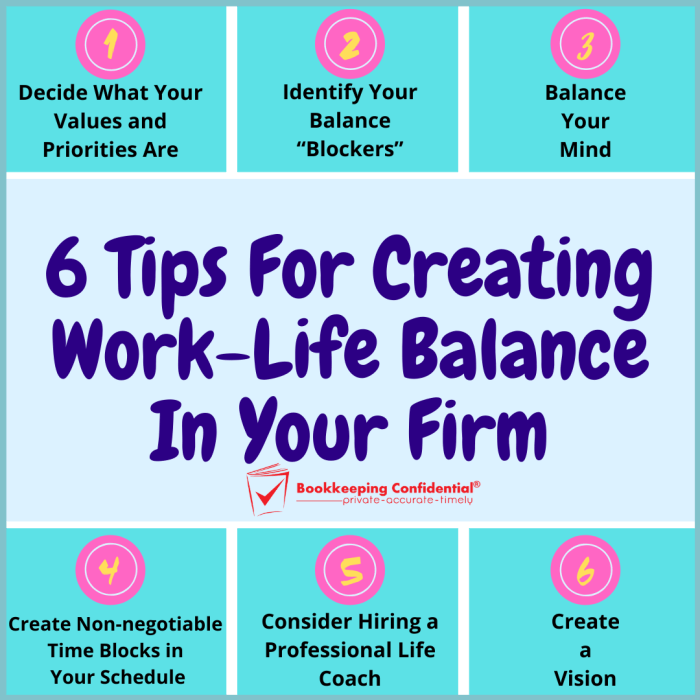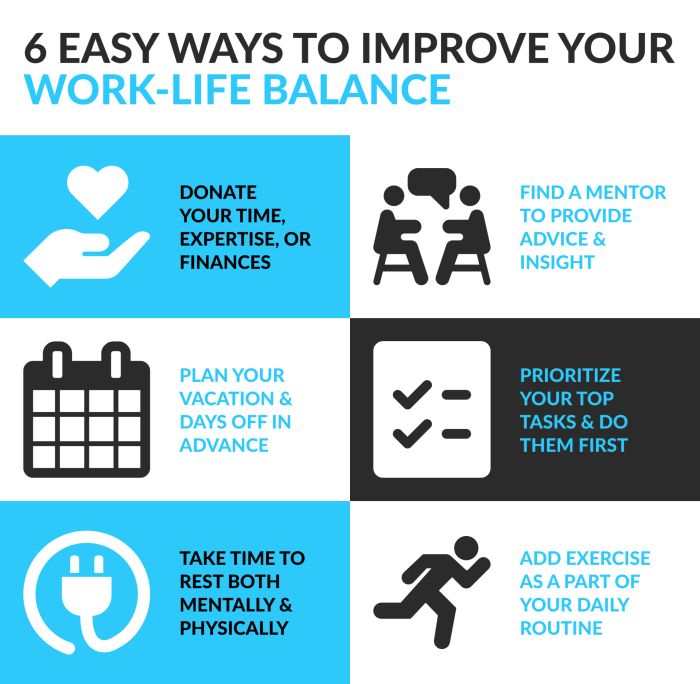Work-Life Balance Tips: Whether you’re juggling school, work, and personal life, finding that perfect equilibrium is key. Let’s dive into practical strategies for a fulfilling lifestyle.
In today’s fast-paced world, balancing work and personal life is more important than ever. We’ll explore essential tips to help you navigate this delicate dance with finesse.
Importance of Work-Life Balance
Achieving a work-life balance is crucial for overall well-being as it helps individuals maintain a sense of harmony between their professional and personal lives. When individuals strike a balance between work and personal life, they experience reduced stress levels, improved mental health, increased productivity, and enhanced relationships.
Benefits of Maintaining Work-Life Balance, Work-Life Balance Tips
- Improved Mental Health: Balancing work and personal life can help reduce feelings of burnout, anxiety, and depression.
- Enhanced Productivity: When individuals have time to relax and recharge outside of work, they are more focused and efficient during work hours.
- Better Relationships: Spending quality time with family and friends strengthens relationships and provides emotional support.
- Physical Well-being: Maintaining a work-life balance can lead to better physical health, as individuals have time to exercise, eat well, and take care of themselves.
Impact of Lack of Work-Life Balance
- Increased Stress: Juggling work and personal responsibilities without balance can lead to high levels of stress, impacting both mental and physical health.
- Burnout: Overworking without taking breaks or time off can result in burnout, causing fatigue, decreased motivation, and a negative outlook on life.
- Strained Relationships: Neglecting personal relationships due to work commitments can strain relationships with family and friends, leading to feelings of isolation and loneliness.
- Health Issues: Chronic stress from an imbalance between work and personal life can contribute to a variety of health issues, including heart disease, obesity, and sleep disorders.
Strategies for Achieving Work-Life Balance

Finding a balance between work and personal life is crucial for overall well-being and productivity. Here are some practical strategies to help you achieve this balance:
Setting Boundaries
- Establish specific work hours and stick to them. Avoid working outside of these hours whenever possible.
- Create a designated workspace at home to separate work from personal life.
- Communicate your boundaries clearly to colleagues and supervisors to ensure they respect your personal time.
Time Management Techniques
- Use a planner or digital calendar to organize tasks and allocate time for work and leisure activities.
- Prioritize tasks based on deadlines and importance to avoid feeling overwhelmed.
- Try time-blocking to dedicate specific time slots to different activities, such as work, exercise, and relaxation.
Prioritizing Tasks
- Identify tasks that are urgent and important, and tackle those first to prevent burnout.
- Delegate tasks whenever possible to lighten your workload and free up time for other activities.
- Practice self-care activities, such as exercise, meditation, or hobbies, to recharge and maintain a healthy balance.
Work-Life Balance Techniques

In today’s fast-paced world, achieving a healthy work-life balance is crucial for overall well-being. Implementing effective techniques can help reduce stress, increase productivity, and enhance overall happiness.
Mindfulness and Stress-Relief Practices
- Practicing mindfulness techniques such as meditation, deep breathing, or yoga can help reduce stress levels and promote a sense of calmness.
- Engaging in stress-relief activities like journaling, listening to music, or taking short breaks throughout the day can significantly improve work-life balance.
- Setting boundaries between work and personal life, such as turning off work notifications during non-work hours, can help maintain a healthy balance.
Importance of Self-Care Routines
- Developing self-care routines, such as getting enough sleep, eating nutritious meals, and exercising regularly, is essential for managing work-related stress.
- Setting aside time for self-care activities like reading a book, taking a relaxing bath, or going for a walk can recharge your energy and improve overall well-being.
- Prioritizing self-care not only benefits your physical health but also enhances mental clarity and emotional resilience in the face of work challenges.
Hobbies and Interests Outside of Work
- Exploring hobbies and interests outside of work, whether it’s painting, gardening, or playing a musical instrument, can provide a much-needed break from work-related stress.
- Engaging in activities that bring you joy and fulfillment can boost creativity, reduce burnout, and improve overall job satisfaction.
- Connecting with like-minded individuals through hobby groups or clubs can also help you build a supportive network outside of work, enhancing your social well-being.
Balancing Work and Family Life: Work-Life Balance Tips
Finding the right balance between work and family can be a challenging task for many individuals. Juggling work responsibilities while making time for family can often lead to stress and burnout. Here are some tips and strategies to help parents manage their work commitments while still prioritizing quality time with their family.
Managing Work Responsibilities and Quality Family Time
- Set boundaries: Establish clear boundaries between work and family time to ensure you are fully present with your loved ones when you are home.
- Plan family activities: Schedule regular family activities or outings to create lasting memories and strengthen your bond with family members.
- Delegate tasks: Delegate household chores or responsibilities to other family members to lighten your load and free up more time for quality family interactions.
- Utilize technology: Use technology to stay connected with your family members throughout the day, whether through video calls or messaging apps.
Challenges in Balancing Work and Family
- Time constraints: Finding enough time to fulfill work duties and spend quality time with family members can be a major challenge.
- Guilt feelings: Many individuals struggle with feelings of guilt when they prioritize work over family or vice versa.
- Work pressure: High work demands can lead to stress and exhaustion, making it difficult to fully engage with family members.
Effective Communication with Family Members
- Regular check-ins: Schedule regular family meetings to discuss schedules, upcoming events, and any concerns or issues that need to be addressed.
- Active listening: Practice active listening when interacting with family members to show that you value their thoughts and feelings.
- Express appreciation: Show gratitude towards your family members for their support and understanding during busy work periods.
